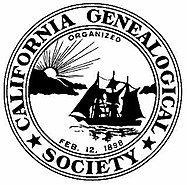
San Francisco Bay is a large tidal estuary in the U.S. state of California, and gives its name to the San Francisco Bay Area. It is dominated by the cities of San Francisco, San Jose, and Oakland.

Mills College at Northeastern University is a private college in Oakland, California and part of Northeastern University's global university system. Mills College was founded as the Young Ladies Seminary in 1852 in Benicia, California; it was relocated to Oakland in 1871 and became the first women's college west of the Rockies. In 2022, it merged with Northeastern University following several years of severe financial difficulties.

The San Francisco Maritime National Historical Park is located in San Francisco, California, United States. The park includes a fleet of historic vessels, a visitor center, a maritime museum, and a library/research facility. The park used to be referred to as the San Francisco Maritime Museum, however the former 1951 name changed in 1978 when the collections were acquired by the National Park Service. Today's San Francisco Maritime National Historical Park was authorized in 1988; the maritime museum is among the park's many cultural resources. The park also incorporates the Aquatic Park Historic District, bounded by Van Ness Avenue, Polk Street, and Hyde Street.

The Chinatown neighborhood in Oakland, California(Chinese: 屋崙華埠), is traditionally Chinese which reflects Oakland's diverse Chinese American, and more broadly Asian American community. It is frequently referred to as "Oakland Chinatown" in order to distinguish it from nearby San Francisco's Chinatown. It lies at an elevation of 39 feet.
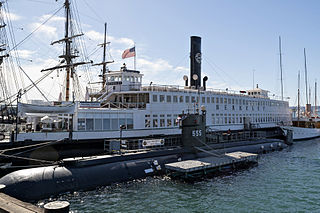
Berkeley was one of several ferryboats of the Southern Pacific Railroad that for sixty years operated on San Francisco Bay between the Oakland Pier and the San Francisco Ferry Building. Built in 1898 by the Union Iron Works of San Francisco, she served after the 1906 earthquake, ferrying refugees across the bay to Oakland.

The Oakland Estuary is the strait in the San Francisco Bay Area, California, separating the cities of Oakland and Alameda and the Alameda Island from the East Bay mainland. On its western end, it connects to San Francisco Bay proper, while its eastern end connects to San Leandro Bay.

The African American Museum and Library at Oakland (AAMLO) is a museum and non-circulating library dedicated to preserving African American history, experiences and culture on 14th Street in Downtown Oakland. It contains an extensive archival collection of such artifacts as diaries, correspondence, photos, and periodicals.
Swiss Americans are Americans of Swiss descent.

The Oakland Public Library is the public library in Oakland, California. Opened in 1878, the Oakland Public Library currently serves the city of Oakland, along with neighboring smaller cities Emeryville and Piedmont. The Oakland Public Library has the largest collection of any public library in the East Bay, featuring approximately 1.5 million items. It consists of a main library located in downtown Oakland, and 16 branch libraries throughout the city.
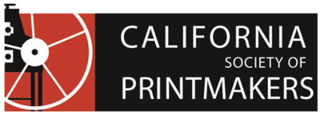
The California Society of Printmakers (CSP) is the oldest continuously operating association of printmakers and friends of printmakers in the United States. CSP is a non-profit arts organization with an international membership of print artists and supporters of the art of fine printmaking. CSP promotes professional development and opportunity for printmakers, and educates artists and the public about printmaking. New members are admitted by portfolio review. Friends, Institutional and Business members are admitted by fee. CSP is based in the San Francisco Bay Area, California.
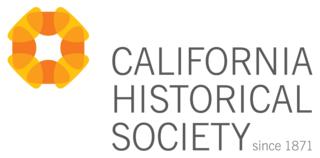
The California Historical Society (CHS) is the official historical society of California. It was founded in 1871, by a group of prominent Californian intellectuals at Santa Clara University. It was officially designated as the Californian state historical society in 1979. Its headquarters are in San Francisco, though it hosts exhibits and collections across California.

At 05:12 Pacific Standard Time on Wednesday, April 18, 1906, the coast of Northern California was struck by a major earthquake with an estimated moment magnitude of 7.9 and a maximum Mercalli intensity of XI (Extreme). High-intensity shaking was felt from Eureka on the North Coast to the Salinas Valley, an agricultural region to the south of the San Francisco Bay Area. Devastating fires soon broke out in San Francisco and lasted for several days. More than 3,000 people died, and over 80% of the city was destroyed. The event is remembered as the deadliest earthquake in the history of the United States. The death toll remains the greatest loss of life from a natural disaster in California's history and high on the lists of American disasters.

David Hewes, was an American born into one of the "old families" of Massachusetts that could be traced back seven generations to the patriot Joshua Hewes. Hewes is associated with the construction and completion of the First transcontinental railroad, although he was an enthusiastic supporter rather than being directly connected with the construction thereof. He provided a golden spike marking completion of the railroad and he also planned the connection of the railroad company's wires to Western Union so the taps of the silver hammer driving the golden spike at Promontory Summit, Utah Territory could be heard instantaneously coast-to-coast.
Board of Pilot Commissioners for the Bays of San Francisco, San Pablo, and Suisun is the California state agency responsible for licensing and regulating pilots within one of the largest harbors in the world and the tributary Sacramento River delta. It licenses and regulates up to 60 pilots of the San Francisco Bar Pilots Association. They are called "bar pilots" because they maneuver ships across a large and dangerous sand bar just outside the Golden Gate at the mouth of San Francisco Bay.
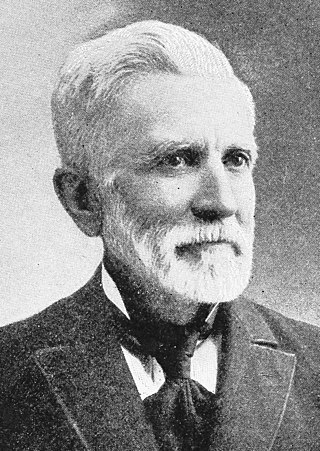
John Swett is considered to be the "Father of the California public school" system and the "Horace Mann of the Pacific".
The following is a timeline of the history of the city of San Francisco, California, United States.
The following is a timeline of the history of the city of Oakland, Alameda County, California, United States.
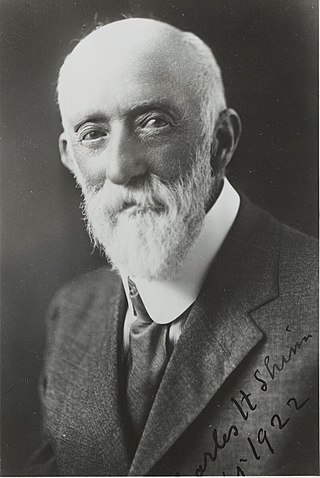
Charles Howard Shinn was a horticulturalist, author, inspector of California Experiment Stations, and forest ranger in California.

The Sutro Library is a branch of the California State Library located in San Francisco on the campus of San Francisco State University. The foundation of the library's collection was assembled by former San Francisco mayor, engineer, entrepreneur, and philanthropist Adolph Sutro. The library was deeded to the State of California by Sutro's heirs with the stipulation that it never leave the city limits of San Francisco, filling his desire to provide the city with a public research library. It was formally given to California State Library in 1913, and opened to the public in 1917. Notably, half of the Sutro collection survived the "Great Fire" after the San Francisco earthquake of 1906. Collection highlights include 125,000 rare books, antiquarian maps, and archival collections, as well as a genealogical library.
